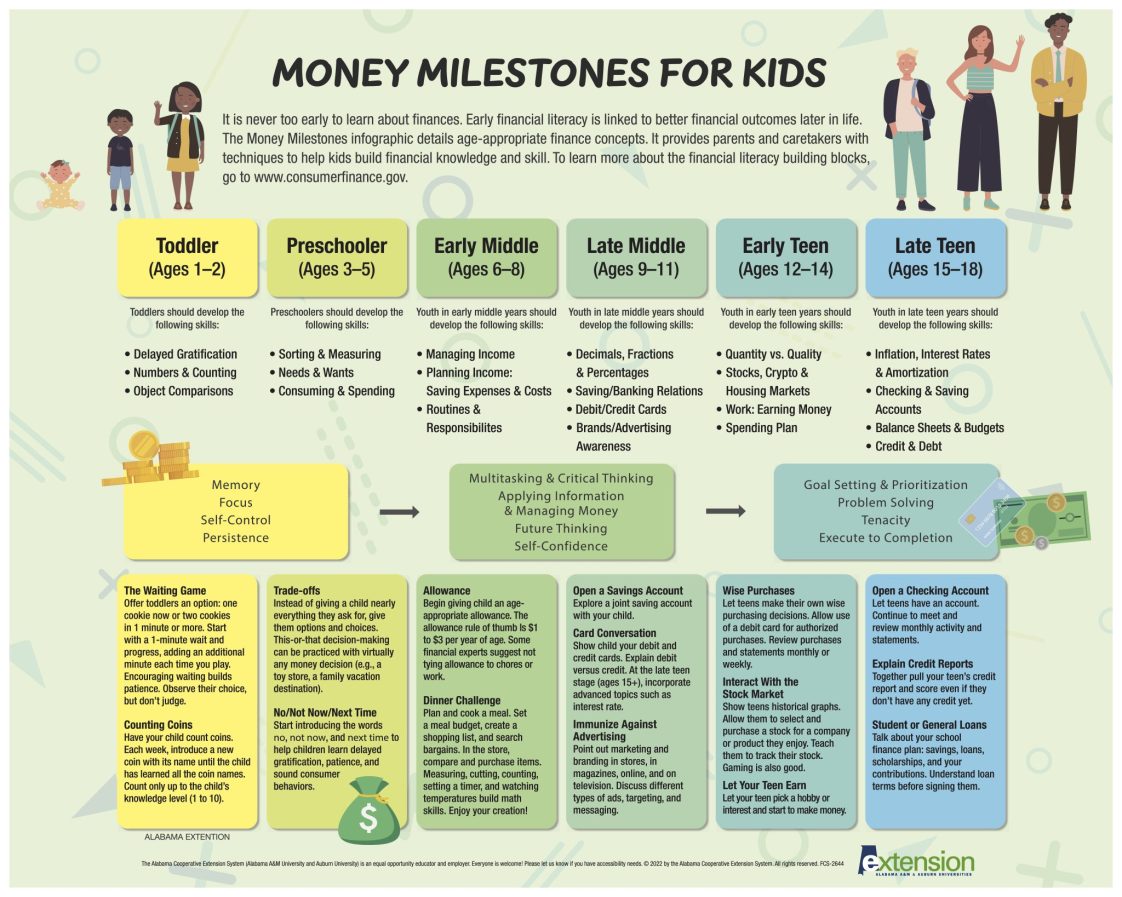Finance & Career

It is never too early to learn about finances. Early financial literacy is linked to better financial outcomes later in life. The Money Milestones infographic details age-appropriate finance concepts. It provides parents and caretakers with techniques to help kids build financial knowledge and skill. To learn more about the financial literacy building blocks, go to www.consumerfinance.gov.
Toddler (Ages 1–2)
Toddlers should develop the following skills:
- Delayed Gratification
- Numbers & Counting
- Object Comparisons
The Waiting Game
Offer toddlers an option: one cookie now or two cookies in 1 minute or more. Start with a 1-minute wait and progress, adding an additional minute each time you play. Encouraging waiting builds patience. Observe their choice, but don’t judge.
Counting Coins
Have your child count coins. Each week, introduce a new coin with its name until the child has learned all the coin names. Count only up to the child’s knowledge level (1 to 10).
Preschooler (Ages 3–5)
Preschoolers should develop the following skills:
- Sorting & Measuring
- Needs & Wants
- Consuming & Spending
Trade-offs
Instead of giving a child nearly everything they ask for, give them options and choices. This-or-that decision-making can be practiced with virtually any money decision (e.g., a toy store, a family vacation destination).
No/Not Now/Next Time
Start introducing the words no, not now, and next time to help children learn delayed gratification, patience, and sound consumer behaviors.
Early Middle (Ages 6–8)
Youth in early middle years should develop the following skills:
- Managing Income
- Planning Income: Saving Expenses & Costs
- Routines & Responsibilities
Allowance
Begin giving child an age- appropriate allowance. The allowance rule of thumb Is $1 to $3 per year of age. Some financial experts suggest not tying allowance to chores or work.
Dinner Challenge
Plan and cook a meal. Set a meal budget, create a shopping list, and search bargains. In the store, compare and purchase items. Measuring, cutting, counting, setting a timer, and watching temperatures build math skills. Enjoy your creation!
Late Middle (Ages 9–11)
Youth in late middle years should develop the following skills:
- Decimals, Fractions & Percentages
- Saving/Banking Relations
- Debit/Credit Cards
- Brands/Advertising Awareness
Open a Savings Account
Explore a joint saving account with your child.
Card Conversation
Show child your debit and credit cards. Explain debit versus credit. At the late teen stage (ages 15+), incorporate advanced topics such as interest rate.
Immunize Against Advertising
Point out marketing and branding in stores, in magazines, online, and on television. Discuss different types of ads, targeting, and messaging.
Early Teen (Ages 12–14)
Youth in early teen years should develop the following skills:
- Quantity vs. Quality
- Stocks, Crypto & Housing Markets
- Work: Earning Money
- Spending Plan
Wise Purchases
Let teens make their own wise purchasing decisions. Allow use of a debit card for authorized purchases. Review purchases and statements monthly or weekly.
Interact With the Stock Market
Show teens historical graphs. Allow them to select and purchase a stock for a company or product they enjoy. Teach them to track their stock. Gaming is also good.
Let Your Teen Earn
Let your teen pick a hobby or interest and start to make money.
Late Teen (Ages 15–18)
Youth in late teen years should develop the following skills:
- Inflation, Interest Rates & Amortization
- Checking & Saving Accounts
- Balance Sheets & Budgets
- Credit & Debt
Open a Checking Account
Let teens have an account. Continue to meet and review monthly activity and statements.
Explain Credit Reports
Together pull your teen’s credit report and score even if they don’t have any credit yet.
Student or General Loans
Talk about your school finance plan: savings, loans, scholarships, and your contributions. Understand loan terms before signing them.
Concepts Developed by Age Group
Toddler/Preschooler
- Memory
- Focus
- Self-Control
- Persistence
Early Middle/Late Middle
- Multitasking & Critical Thinking
- Applying Information & Managing Money
- Future Thinking
- Self-Confidence
Early Teen/Late Teen
- Goal Setting & Prioritization
- Problem Solving
- Tenacity
- Execute to Completion
Portia Johnson, Extension Specialist, Assistant Professor, Auburn University
New March 2022, Money Milestones for Kids, FCS-2644

